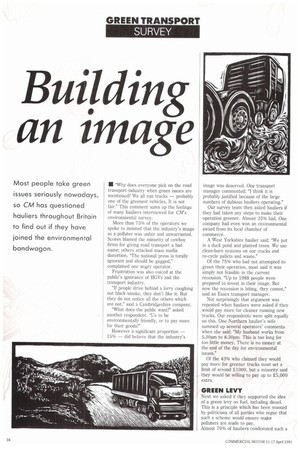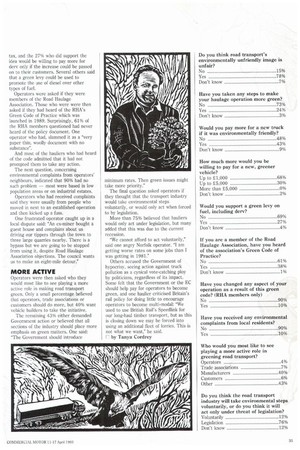Building an image
Page 36

Page 37

If you've noticed an error in this article please click here to report it so we can fix it.
• "Why does everyone pick on the road transport industry when green issues are mentioned? We all run trucks — probably one of the greenest vehicles. It is not fair." This comment sums up the feelings of many hauliers interviewed for CM's environmental survey.
More than 75% of the operators we spoke to insisted that the industry's image as a polluter was unfair and unwarranted. Scores blamed the minority of cowboy firms for giving road transport a bad name; others attacked mass media distortion. "The national press is totally ignorant and should be gagged," complained one angry operator.
Frustration was also voiced at the public's ignorance of HGVs and the transport industry.
"If people drive behind a lorry coughing out black smoke, they don't like it. But they do not notice all the others which are not," said a Cambridgeshire company.
"What does the public want?" asked another respondent. "Us to be environmentally friendly, or to pay more for their goods?"
However a significant proportion — 15% — did believe that the industry's image was deserved. One transport manager commented: "I think it is probably justified because of the large numbers of dubious hauliers operating."
Our survey team then asked hauliers if they had taken any steps to make their operation greener. Almost 25% had. One company had even won an environmental award from its local chamber of commerce.
A West Yorkshire haulier said: "We put in a duck pond and planted trees. We use clean-burn systems on our trucks and re-cycle pallets and waste."
Of the 75% who had not attempted to green their operation, most said it was simply not feasible in the current recession. "Up to 1988 people were prepared to invest in their image. But now the recession is biting, they cannot," said an Essex transport manager.
Not surprisingly that argument was repeated when hauliers were asked if they would pay more for cleaner running new trucks. Our respondents were split equally on this. One Northern haulier's wife summed up several operators' comments when she said: "My husband works from 5.30am to 8.30pm. This is too long for too little money. There is no money at the end of the day for environmental issues."
Of the 43% who claimed they would pay more for greener trucks most set a limit of around £1000, but a minority said they would be willing to pay up to £5,000 extra.
GREEN LEVY
Next we asked if they supported the idea of a green levy on fuel, including diesel. This is a principle which has been mooted by politicians of all parties who argue that such a scheme would ensure major polluters are made to pay.
Almost 70% of hauliers condemned such a tax, and the 27% who did support the idea would be willing to pay more for dery only if the increase could be passed on to their customers. Several others said that a green levy could be used to promote the use of diesel over other types of fuel.
Operators were asked if they were members of the Road Haulage Association. Those who were were then asked if they had heard of the RHA's Green Code of Practice which was launched in 1989. Surprisingly, 61% of the RHA members questioned had never heard of the policy document. One operator who had, slammed it as a "very paper thin, woolly document with no substance".
And most of the hauliers who had heard of the code admitted that it had not prompted them to take any action.
The next question, concerning environmental complaints from operators' neighbours, indicated that 90% had no such problem — most were based in low population areas or on industrial estates.
Operators who had received complaints said they were usually from people who moved in next to an established operation and then kicked up a fuss.
One frustrated operator caught up in a local dispute said: "An ex-miner bought a guest house and complains about us driving our tippers through the town to three large quarries nearby. There is a bypass but we are going to be stopped from using it, despite Road Haulage Association objections. The council wants us to make an eight-mile detour."
MORE ACTIVE
Operators were then asked who they would most like to see playing a more active role in making road transport green. Only a small percentage believed that operators, trade associations or customers should do more, but 40% want vehicle builders to take the initiative.
The remaining 43% either demanded Government action or believed that all sections of the industry should place more emphasis on green matters. One said: "The Government should introduce minimum rates. Then green issues might take more priority."
The final question asked operators if they thought that the transport industry would take environmental steps voluntarily, or would only act when forced to by legislation.
More than 75% believed that hauliers would only act under legislation, but many added that this was due to the current recession.
"We cannot afford to act voluntarily," said one angry Norfolk operator. "I am getting worse rates on some jobs than I was getting in 1981."
Others accused the Government of hypocrisy, seeing action against truck pollution as a cynical vote-catching ploy by politicians, regardless of its impact. Some felt that the Government or the EC should help pay for operators to become green, and one haulier criticised Britain's rail policy for doing little to encourage operators to become multi-modal: "We used to use British Rail's Speedlink for our long-haul timber transport, but as this is closing down we may be forced into using an additional fleet of lorries. This is not what we want," he said.
by Tanya Cordrey
















































































